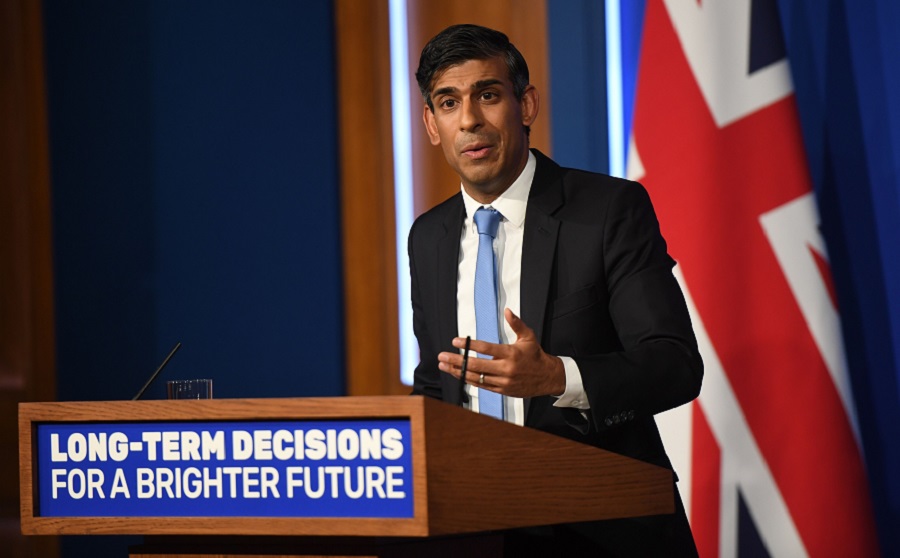
Rishi Sunak, UK prime minister, speaks at a news conference in Downing Street in London, UK, on Wednesday, Sept. 20, 2023. Sunak was told weeks before deciding to roll back his green policies that he risked jeopardizing Britain’s place as a global leader on climate as well as his legally binding net zero goal. Photographer: Chris J. Ratcliffe/Bloomberg
As part of a “new approach” to climate change, British Prime Minister Rishi Sunak will defer the ban on new diesel and gasoline cars and vans until 2035 instead of 2030. UK sales will be limited to completely electric and hydrogen-powered automobiles after 2035. This policy will essentially align the country with other EU countries and other global markets that are making the same initiative. Many European countries, such as Sweden, are improving their EV structure with projects such as ‘Evolution Road’ in a bid to move towards improving their carbon footprint. One thing to note is that the ICE (Internal Combustion Engine) ban will not affect used car sales. This means that many older gasoline and diesel vehicles will likely remain in use after the policy change.
The EU also aims to ban gasoline and diesel cars by 2035. Some countries in the EU, like Germany, intend on creating more exemptions for ICE vehicles such as allowing the sale of them after 2035, however, the UK has not yet backed this initiative. It has been made clear that consumers and businesses should also consider that the Conservative government’s major opposition parties like Labour have pledged to reverse Rishi Sunak’s September 2023 policy shift and reinstate the 2030 date for banning new petrol and diesel automobiles.
Government Support for Electric Vehicles Switch
The UK government has aimed to invest £1.3 billion in EV charge points for streets, homes, and motorways to help the country shift away from fossil fuel cars. This investment should essentially stimulate consumer and business EV and PHEV use. To meet the electricity demand from more EVs, the government is investing in battery research and mass manufacture and subsidising nuclear power stations.
The government has refused industry pleas to incentivize EV customers with public funds, even though car makers will be required to sell more EVs (22% in 2024 and 80% by 2030).
Private EV owners in the UK have not yet received car grants since the government ended the program in 2022. EV demand from fleet users has soared while private demand has stagnated. This is because company car purchasers who pick EVs over petrol or diesel receive large benefit-in-kind incentives.
The History Of The 2035 Gasoline/Diesel Ban
Former Environmental Secretary Michael Gove campaigned for a ban on new petrol and diesel vehicles in 2017. It was agreed that new cars with internal combustion engines would be phased out by 2040. A consultation was held in 2020 to determine whether a restriction on hybrid car sales by 2035 was appropriate. According to the findings of that inquiry, the government regarded both 2035 and an earlier date ‘realistic,’ and chose 2030 in 2020, with some room for plug-in hybrids with a ‘significant’ electric range. Because of rising costs and public criticism, Prime Minister Rishi Sunak has delayed the government’s net zero strategy until 2035.
As part of its £12 billion “Green Industrial Revolution,” the government hopes to create 250,000 jobs by investing more in battery technology, carbon capture, and green energy. In the UK’s “industrial heartlands,” which include the Yorkshire and the Humber, North East, Scotland, West Midlands, and Wales ” there is likely to be around 50,000 new jobs available.
Anti-Ban Arguments
Automakers questioned Sunak’s decision to delay the goal to 2023 as they had already invested heavily in 2030. Kia, which plans to launch nine electrified cars in Britain in the coming years, was vocal in their disappointment by the policy change.
Analysts have argued that the government’s deferral put the UK at risk of losing ground in its greener transportation effort. They also argued it would deter electric vehicle purchases and disrupt electric charging station operators.
This setback could potentially hurt the battery, solar, and green energy markets. Sunak said the policy move will align the UK with the EU’s 2035 combustion car sales ban.
